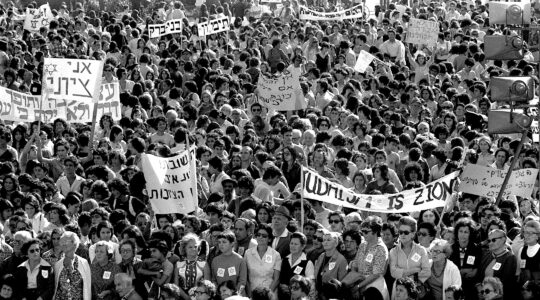JERUSALEM (JTA) – In his speech opening the Knesset’s winter session, Prime Minister Ehud Olmert spoke of the haphazard, “patch by patch” development of Israel’s governing principles. While the quilt that this country’s leadership has stitched together over the past 60 years has held thus far, Olmert made clear that the threads are beginning to fray.
In an effort to remedy this deterioration, the prime minister dedicated a major section of that Oct. 15 address to stressing that he and many other national leaders are ready to invest in a new, custom-built Israeli constitution – a blanket large enough to cover the “complex reality” of modern Israel.
It is Olmert’s hope, as well as that of many influential members of the Israeli government, that a first reading of the constitution be ready for the 60th anniversary of the state, Israeli Independence Day on May 14, 2008.
Fortunately, this 17th Knesset has a groundbreaking tool at its disposal to aid in achieving this lofty goal – a constitutional draft written over the past seven years by the Israel Democracy Institute.
The institute’s Constitution by Consensus was drafted following in-depth analyses, heated debates and painful compromises among a wide sampling of Israelis. It currently serves as the basis and primary working document for the Knesset Constitution, Law and Justice Committee.
The Constitution by Consensus formulates a unique balance between democracy and Jewish identity in Israel – a relationship providing no shortage of challenging questions and stirring intense emotion. In Israel, religious and nationalistic passions run deep and society is as intricate as it is volatile. Agreeing upon basic human rights, not to mention an underlying religious identity and raison d’etre, is a task of vast proportions.
For that reason, David Ben-Gurion made the strategic decision during the early years of the state to postpone the writing of a constitution until a more appropriate time.
Perhaps that mythical time is upon us.
Since 1948, Israeli history has been filled with struggle – to absorb its immigrants, to build a viable economy, to protect its citizens from unending existential threat. Consequently, many state institutions and national policies developed organically based upon immediate need and without significant planning or foresight.
Israel Democracy Institute researchers, well acquainted with this phenomenon, set out in June 2000 to create a formal document outlining, among other things, the irrevocable identity of Israel as a Jewish state, the boundaries between the various branches of government and the basic freedoms of all Israeli citizens. The resulting comprehensive constitutional draft, written under the leadership of the president emeritus of the Supreme Court, Justice Meir Shamgar, has given definition and shape to the principles that will chart both a strategically sound and an ethically just national path.
With the help of scholars and activists, top policymakers are now recognizing that many components necessary for a democracy’s healthy, sustainable functioning are missing in the Israeli system. They are shown the tremendous loss of public confidence in political institutions and explained the endemic public apathy. They are taught about the rampant inefficiencies and unclear boundaries between the branches of government, which most recently led to disgraceful public confrontations between the Supreme Court and the Justice Ministry.
They are exposed to the repercussions of the widening rift between religious and secular communities and helped to understand the implications of an increasingly disenfranchised Arab minority. The corruption plaguing the political arena is laid clearly before them for reflection.
Additionally, there is widespread acknowledgement that domestic resilience and national unity are of vital importance given the central role played by the State of Israel in the interplay between Arab and Western nations, and in light of the other unrelenting geopolitical complexities Israel faces.
With difficult realities and changing times, growing numbers of politicians, academics and citizens from all sectors have joined the call for Israel to adopt a constitution. Most recently, the powerful fervently Orthodox Shas party recognized the contribution that a constitution can make to the health of Israeli democracy. The party’s spiritual leader and leading Sephardi rabbi in Israel, Ovadia Yosef, directed Knesset members from Shas to support the constitutional effort.
The swelling of constitution conversation across Israel indicates that this indeed is an exciting time for the Israeli people and for the future generations who may indeed come to live in a better-defined and confident state; a state with more freedom and equity for all of its citizens; a state at peace with its identity and purpose; and a state with a repaired, transparent and efficient government.
Those interested in the strengthening of justice and law in Israel must continue to publicize and bolster the effort toward the creation of a constitution. In this way, our combined stitches can aid in producing a durable new constitutional fabric to protect the functioning, identity and citizens of the state.
Barak Cohen is a Jerusalem-based columnist and a researcher at the Israel Democracy Institute.

Help ensure Jewish news remains accessible to all. Your donation to the Jewish Telegraphic Agency powers the trusted journalism that has connected Jewish communities worldwide for more than 100 years. With your help, JTA can continue to deliver vital news and insights. Donate today.





